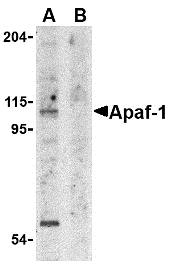Catalog# : 2013
Apoptosis is related to many diseases and induced by a family of cell death receptors and their ligands. Cell death signals are transduced by death domain containing adapter molecules and members of the caspase family of proteases. The mammalian homologues of the key cell death gene CED-4 in C. elegans has been identified recently from human and mouse and designated Apaf1 (for apoptosis protease-activating factor 1) (1,2). Apaf1 binds to cytochrome c (Apaf-2) and caspase-9 (Apaf-3), which leads to caspase-9 activation. Activated caspase-9 in turn cleaves and activates caspase-3 that is one of the key proteases, being responsible for the proteolytic cleavage of many key proteins in apoptosis (3). Apaf1 can also associate with caspase-4 and caspase-8 (4). Apaf1 is ubiquitously expressed in human tissues .
Additional Names : Apaf1 (NT), Apaf1, Apaf-1
 Description
DescriptionLeft: Western blot analysis of Apaf1 in K562 cell lysate with Apaf1 antibody at 1 µg/ml in the (A) absence and (B) presence of blocking peptide. Below: Immunohistochemistry of Apaf1 in human heart tissue with Apaf1 antibody at 1 µg/ml.
Source : Apaf1 antibody was raised against a peptide corresponding to amino acids near the amino terminus of human Apaf1. The sequences of the immunogenic peptide are identical between human and mouse.
Purification : Affinity chromatography purified via peptide column
Clonality and Clone : This is a polyclonal antibody.
Host : Apaf1 antibody was raised in rabbit.
Immunogen : Human Apaf1 (N-Terminus) Peptide (Cat. No. 2013P)
Tested Application(s) : E, WB, IHC
Buffer : Antibody is supplied in PBS containing 0.02% sodium azide.
Blocking Peptide : Cat. No. 2013P - Apaf1 Peptide
Long-Term Storage : Apaf1 antibody can be stored at 4ºC, stable for one year. As with all antibodies care should be taken to avoid repeated freeze thaw cycles. Antibodies should not be exposed to prolonged high temperatures.
Positive Control
- Cat. No. 1204 - K562 Cell Lysate
GI Number : 2330015
Accession Number : AAC51678
Short Description : (NT) Apoptotic protease activating factor 1
References
- Zou H, Henzel WJ, Liu X, Lutschg A, Wang X. Apaf1, a human protein homologous to C. elegans CED-4, participates in cytochrome c-dependent activation of caspase-3. Cell 1997;90:405-13
- Cecconi F, Alvarez-Bolado G, Meyer BI, Roth KA, Gruss P. Apaf1 (CED-4 homolog) regulates programmed cell death in mammalian development. Cell 1998;94:727-37
- Li P, Nijhawan D, Budihardjo I, Srinivasula SM, Ahmad M, Alnemri ES, Wang X. Cytochrome c and dATP-dependent formation ofApaf1/caspase-9 complex initiates an apoptotic protease cascade. Cell 1997;91:479-89
- Hu Y, Benedict MA, Wu D, Inohara N, Nunez G. Bcl-XL interacts with Apaf1 and inhibits Apaf1-dependent caspase-9 activation. Proc Natl Acad Sci USA 1998;95:4386-91 (RD1299)

No comments:
Post a Comment